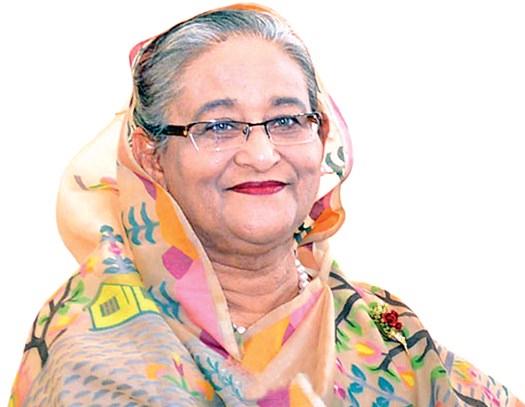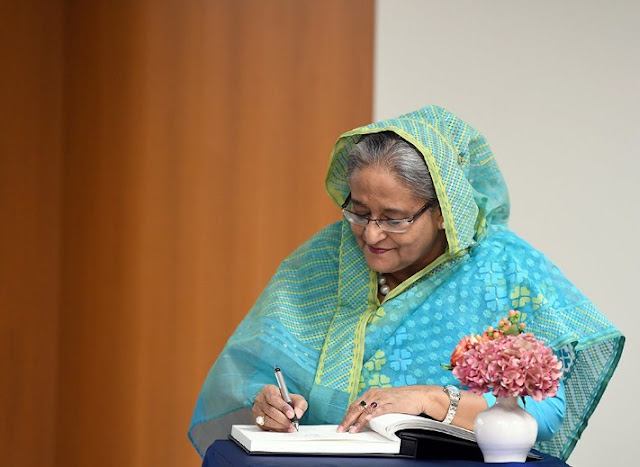 |
Bangladeshi Prime Minister Sheikh Hasina |
Sheikh Hasina
Sheikh Hasina Wazed (Bengali: শেখ হাসিনা ওয়াজেদ; born 28 September 1947) is the current and 10th Prime Minister of Bangladesh, in office since January 2009.
Hasina is the daughter of Bangladesh's first President Sheikh Mujibur Rahman. Her political career has spanned more than four decades. She previously served as opposition leader from 1986 to 1990 and from 1991 to 1995, as Prime Minister from 1996 to 2001, and has been leading the Bangladesh Awami League since 1981. In 2008, she returned as Prime Minister with a landslide victory. In January 2014, she became Prime Minister for a third term in an unopposed election, violating the key rules of the Constitution.
Hasina is one of the most powerful women in the world, ranking 30th on Forbes' list of The World's 100 Most Powerful Women in 2017. Hasina is a member of the Council of Women World Leaders, an International network of current and former women presidents and prime ministers. In 2017 Hasina has been featured distinctively in a book named Women Presidents and Prime Ministers as one of the 18 current women national leaders of the world.
Two of the most outstanding achievements of Sheikh Hasina are her leadership-roles and success behind the trials of Bangabandhu killers and the persons who committed crimes against humanity in 1971.
Hasina's second term (2009 to 2014) as Prime Minister is overshadowed by quite a few scandalous incidents. These include Padma Bridge Scandal, Hallmark-Sonali Bank Scam, Share market Scandal, Rana Plaza collapse, and Bangladesh road safety protests 2018.
For the better part of the last two decades, Hasina's chief rival has been BNP leader Khaleda Zia, and their rivalry is popularly known as the "Battle of Begums". The two women have alternated as non-interim Prime Ministers since 1991.
Prime Minister of Bangladesh
The Prime Minister of the People's Republic of Bangladesh (Bengali: বাংলাদেশের প্রধানমন্ত্রী, translit. Bangladesher Prodhanmontri) is the Head of the Government of Bangladesh. The Prime Minister and the Cabinet are collectively accountable for their policies and actions to the Parliament, to their political party and ultimately to the electorate.
 |
PM Sheikh Hasina |
The position was absent during years of 1975–78, 1982-84 and 1990-91 due to imposed martial law. In each of these periods, the military junta led by the President had the powers of the Prime Minister. During the period between 1996 and 2008, The Chief Adviser of the Caretaker Government of the People's Republic of Bangladesh used to take over as the Head of Government for 90 days during the transition between one elected government to another. The Chief Adviser headed an Advisory Committee comprising ten Advisers. With powers roughly equivalent to those of the Prime Minister of an elected government, his executive power was constrained with certain constitutional limitations. The system was scrapped in 2011 by the 15th amendment of the constitution to allow the political government to conduct any General Election in future.
The current Prime Minister, Sheikh Hasina Wazed, was appointed on 6 January 2009 by the President of Bangladesh.
Early life
See also: Sheikh–Wazed family
Sheikh Hasina was born in Tungipara, East Pakistan on 28 September 1947. She is the daughter of Sheikh Mujibur Rahman, first president of Bangladesh, and Sheikh Fazilatunnesa Mujib. As she said in many interviews that she had grown up in fear due to her father's political works. During the peak of violence of the 1970 Elections in Pakistan as well as her father's arrest she had lived in refuge with her grandmother. Saying "I was not allowed to go to the school. Because I had to cross the canal by a wooden bridge, she was very much afraid that if I fall from this wooden bridge I will fall into the river". She was active in the student politics of Eden Girl's College, Dhaka Hasina was not in Bangladesh when her father was assassinated on 15 August 1975. She was not allowed to return to the country until after she was elected to lead the Awami League Party on 16 February 1981 and arrived on 17 May 1981. She is the aunt of British MP Tulip Siddiq.
Early political career
Chairperson of Bangladesh Awami League
The movement against General Ershad's presidency
While living in self-exile in India after her father and family's assassination in 1975 (only she and a sister survived as they were in West Germany), Hasina was elected President of the Bangladesh Awami League in 1981. The Awami League has been described as a "left-of-centre" party.
Hasina was in and out of detention throughout the 1980s. In 1984, Hasina was put under house arrest in February and again in November. In March 1985, she was put under house arrest for three months. Her party, along with the Bangladesh Nationalist Party, led by Ziaur Rahman's widow Khaleda Zia, continued to work to restore democratically elected government, which they achieved by the democratic election in 1991, won by the BNP.
 |
Bangladesh Prime Minister Sheikh Hasina |
A leader of the opposition, 1986–87
Hasina and the Awami League participated in the 1986 parliamentary elections held under President Ershad. She served as the leader of the opposition in 1986–1987. Hasina's decision to take part in the election had been criticised by her opponents since the election was held under the martial law, and the other main opposition group, led by Khaleda Zia, boycotted the poll. However, her supporters maintained that she used the platform effectively to challenge Ershad's rule. Ershad dissolved the parliament in December 1987 when Hasina and her Awami League resigned from the parliament in an attempt to call for a fresh general election to be held under a neutral government. During November and December in 1987, mass uprising happened in Dhaka, several people were killed including Noor Hossain, a Hasina supporter.
Source: wikipedia
Comments
Post a Comment